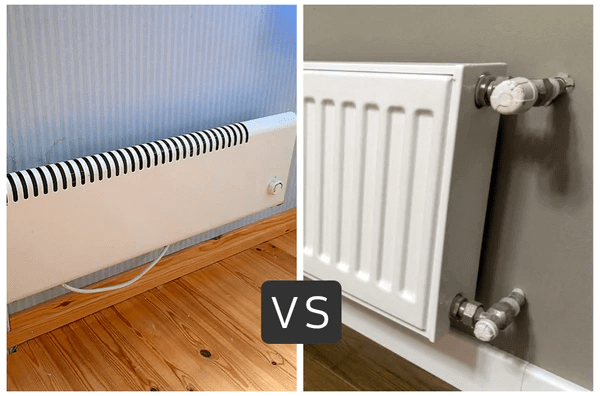Heaters make it possible to stay comfortable during winter and other cold periods. This is by providing the needed warmth. But besides this, the provided warmth also ensures that the electrical and mechanical systems that are indoors remain in the right state.
Several types of heaters can be used. Gas and electric heaters are two of the most common options. Most people who need this equipment find themselves having to choose between either of these.
Such people will find this article very helpful. This is because a comparison of both options will be done in this article.
Gas Heaters vs. Electric Heaters: Which One Is Best for You?

It is hard to outrightly say that one is better than the other. The reason is that there are areas in which both options come off as better than the other. The secret to making the right choice is to understand their highs and lows. This information should then be used in choosing something that would best suit you.
By the way, what suits you might not be the best choice for another person. Now that we have made this clear, here are some things to know about both heaters so that you can choose the best one for you:
Operating Cost – Gas Heaters Require Less
The cost of purchasing a heater is not the only cost that would be required. You would even realize that operating cost is a lot more than purchase cost in the long term. This is why your decision to get a heater should not only be determined by the equipment’s purchase cost alone.
Bearing this in mind, you should know that the cost of operating a gas heater in Australia is cheaper. This is particularly if it is natural rather than the more expensive Liquified Petroleum Gas (LPG). Some extra measures will also reduce the operating cost. One such is zoning the heating system. What this means is having the system constructed in a way that you can stop the supply of heat to parts of the building where it is not needed.
However, we can only take this stance in the meantime. This is because of how gas prices are being affected by several factors in recent times. As a result, the future cost may make electric heaters the more economical option. Gas heaters seem like the most cost-effective option when you consider operating costs for the time being.
Gas Heaters Need Servicing
Both options require maintenance services just like any equipment. However, gas heaters are known to require more maintenance than electric ones.
It is the same situation with installation. There are more complexities involved in installing gas heaters than electric ones. As a result, more maintenance services are required to make sure nothing goes wrong with the entire setup.
So, people who opt for this option need to understand that they are expected to do more in terms of maintenance. It is also important that the right hands are trusted with the task of installing and maintaining (especially) gas heaters. You can visit: https://www.heroplumbing.com.au/gas-heater-service/sydney for more information about this.
Heating Performance
Deciding which one is better in this regard is quite tricky. Gas heaters seem to be the better choice for large spaces. The reason is that it heats the space very quickly and in an intense manner.
However, there can be issues with even distribution of heat. This is an area electric heaters are known to do better. Although they are not as quick and intense in their performance, they are better at evenly heating the space. This makes them a better choice for small spaces.
Speaking of performance, electric heaters also often do better when it comes to energy efficiency. This is considering how all of their energy is transformed into heat. On the other hand, some of the gas-generated heat ends up lost through the ventilation system or flue, as the case may be.
Safety – Electric Heater Are Slight Better
Frankly, this is almost a tie but with more detailed observation of how they both work, you would see electric heaters as better. The major flaw with the gas option is the need for combustion. As a result, a lack of proper ventilation can lead to carbon monoxide poisoning.
There is also the unflued gas heater option that requires more monitoring. It also needs to be installed in a way that grants it adequate airflow. Failure to do this will cause the release of pollutants and moisture into the heated space.
While this sounds scary, the truth is that a lot of this equipment is made with safety features. FFD (Flame Failure Device) and ODS (Oxygen Depletion Sensor) are examples of some of the safety features in many of them.
Also, this equipment is supposed to be compliant with Australian Regulatory standards. You can click here for more on this subject.
The advantage that electric options have is that they do not work with combustion. As a result, the risk of carbon monoxide poisoning through leakage is greatly reduced. However, caution is also of the essence with them. For instance, they are more prone to electrical hazards and overheating.
Eco-Friendliness
Do not be too quick to assume electrical options are more eco-friendly. This is because the electricity source also counts. Electricity may be generated from sources that do so much damage by contributing to greenhouse gas emissions.
On the other hand, some gas heaters are fueled by gas obtained from low-carbon and renewable sources. This does not rule out the fact that they are not entirely eco-friendly because of how they operate. However, it means that the adverse environmental impact is less severe.
By and large, electric heaters are directly more eco-friendly. This is judged by their direct performance and not by their energy source.
Conclusion
You should consider the highs and lows when choosing between an electric or gas heater. You should also take cognizance of your heating needs and get what would suit you best. For instance, an electric heater seems like a better choice for small spaces. On the other hand, a gas heater is better for large spaces because of its performance speed and intensity.

